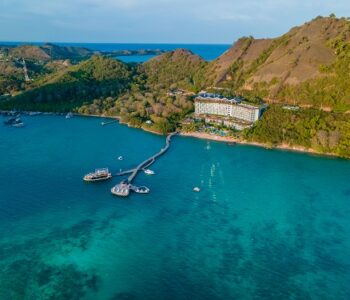
Entering four weeks of social distancing, the Covid-19 crisis in Jakarta has been dire with continually rising number of new cases and fatalities, causing most deaths recorded nationwide. Jakarta — as the epicenter of the outbreak — is starting to implement large-scale social restrictions (PSBB) in the capital after a regulation was passed by the Health Ministry. This order will be efectively starting on Friday, 10 April.
In the first week of April, the city has added a number of social limitations and obligatory precaution for its residents including the requirement to wear a mask for daily mobility as the new Covid-19 cases predominantly appeared in the Big Durian. Since the Jakarta City Government proposed to implement large-scale social restrictions (PSBB) to the ministry last week plus with public pressure on imposing lockdown, the Health minister Terawan Agus Putranto has issued a ministerial decree on Tuesday (7/4), stating the measurement to tighten resident mobility in the epicenter.
CNN Indonesia reported 123 deaths of 1,151 total cases in Jakarta, making the mortality rate up to 10,68 per cent. Currently, at least 2,515 people are under surveillance (ODP) in the city (per 7 April). This number seems unpromising as the pandemic hit hardest, continued to worsen the capital city. Jakarta is the first region taking serious measure, despite data of the exact transmission of the virus is still questionable after National Disaster Management Authority (BNPB) has found discrepancy in the statistics provided by the national government with the recorded cases in the region.
The decision has been made with the following several considerations based on results of epidemiological studies and regional preparedness. The action will be followed with the regional policy in order to protect the plunging economy, public health, and other aspects in social terms. As the hardest time will come, Jakarta will be managing some measure to reduce criminality during large-scale social restrictions and panic among its residents.
"We must comply with the provisions regarding the rules of large-scale social restrictions in Jakarta and surrounding areas. We have to break the chain of transmission together by not doing unnecessary social mobilisation," Ministry’s disease control and prevention directorate general, Achmad Yurano said during a press conference on Tuesday evening.
According to the Ministerial Regulation No. 9/2020 on large-scale social restrictions guideline, the measure will be implemented for 14 days according to the longest incubation period of the coronavirus (SARS-CoV-2). The period of the restrictions can be extended for the next 14 days if the curve is not flattened. The implementation is also issued based on the Government Regulation No. 21/22 on large-scale social restrictions.
So, what is restricted and what’s the exception?
Based on Article 13 on Ministerial Regulation, schools and workplaces, religious activity, Activities in public places or facilities, social and cultural activities, as well as public transportation will raise the restriction.
Restrictions
- All places of worship must be closed to the public.
- Funerals of with non COVID-19 disease must be attended with no more than twenty people.
- All air, sea, train, highway (public/private vehicle) transportation services continue to operate with restrictions on the number of passengers and maintaining distance between passengers.
- Logistic transportation is exempt from restrictions to manage the fulfilment of daily needs.
- Crowds in political, sports, entertainment, academic, and cultural gatherings or meetings are prohibited.
Exclusion of restrictions
Some of the following establishments continue to operate for public service but must be maintaining a minimum number of employees and distance settings and prioritising mitigation efforts. This is the exception for the restriction.
Office and Public Facility
- Supermarkets, minimarkets, markets, shop for essential goods
- Pharmaceutical company, pharmacy, medical equipment store
- Hospitals, public health centre (Puskesmas), or health service centre or other establishment related to health services
- Public places or facilities that provide the basic needs for residents including sports activities.
- Food stalls and restaurants
- Freight forwarding services
- Ride hailing transport can only allow us to deliver goods, not passengers
- Banks, insurance offices, payment system providers, and ATMs
- Print and electronic media
- Livestock and agricultural stores: livestock germs, fertilizers, pesticides, medicines and vaccines for livestock, and animal food
- Home depot and store building that sells plywood, cement, steel construction iron, and mild steel
- Telecommunications, internet services, broadcasting and cable services
- Delivery service of basic food items and medical goods
- Gas stations, LPG, retail outlets for Oil and Gas storage
- Power plants, transmission and distribution units and services
- Capital market determined by the Jakarta Stock Exchange
- Cold storage and warehousing services
- Personal security service.
Civil and Government Office
- Indonesian National Army (TNI), and National Police Department (Polri)
- Financial institutions including Bank of Indonesia (BI)
- Ports, airports, transportation hub
- Distribution and logistics center
- Telecommunications office.
- Oil and gas office
- Electricity (PLN)
- Water and sanitation
- Power plants and transmission units
- Firefighters
- National informatics Center
- Jail
- Customs at the harbour, airport, and border
- Quarantine place for animals, fish and plants
- Tax office
- Institutions or agencies responsible for disaster management
- Zoos, nurseries, wildlife, firefighters in the forest, patrols and essential transportation service
- Management of orphanages, nursing homes and other social institutions
Industry
- Production units of essential commodities, including medicines, pharmaceuticals, medical devices, household health supplies, raw materials and intermediates
- Production units that require a continuous process, after obtaining the necessary permits from the Ministry of Industry
- Production of oil and gas, coal and minerals and activities related to mining operations
- Unit for packaging materials for food, medicines, pharmaceuticals and medical devices
- Agricultural activities, staples and horticulture / plantations.
- Export goods production unit
- The unit of production of micro small and medium enterprises (SMEs)






